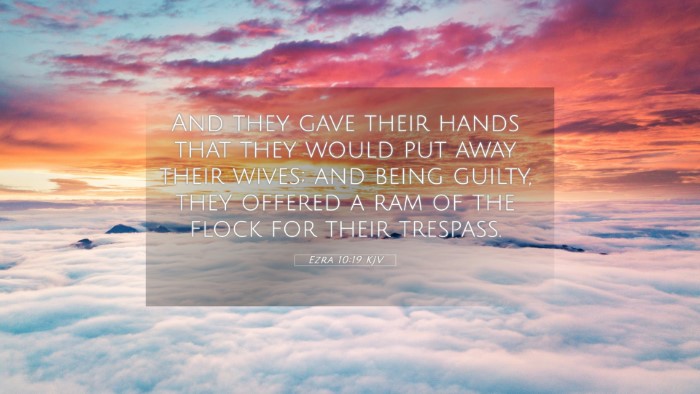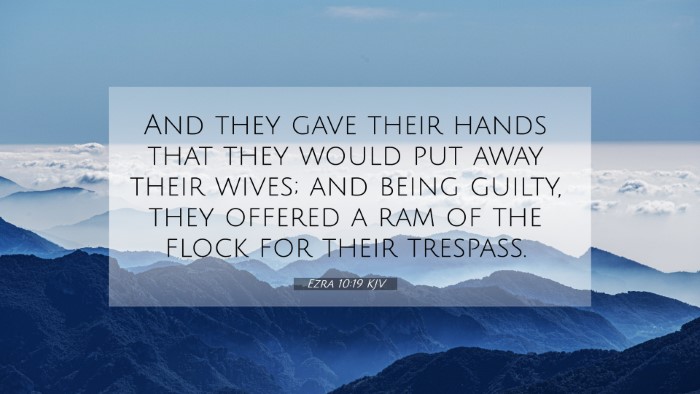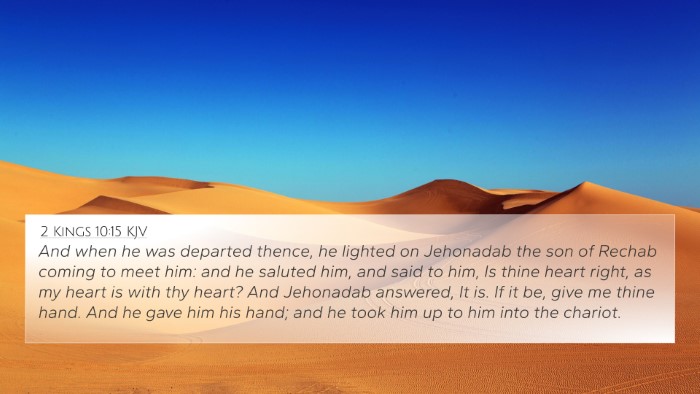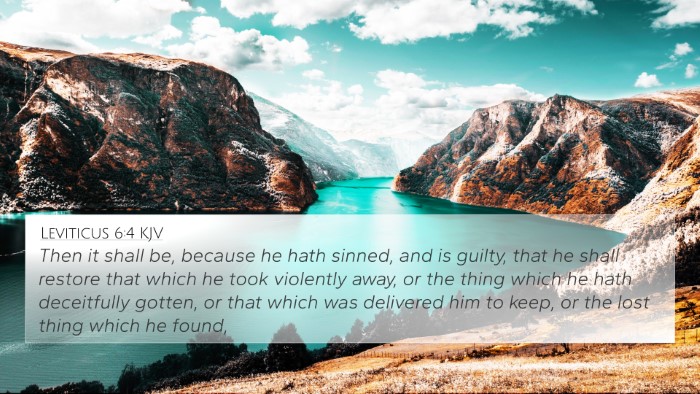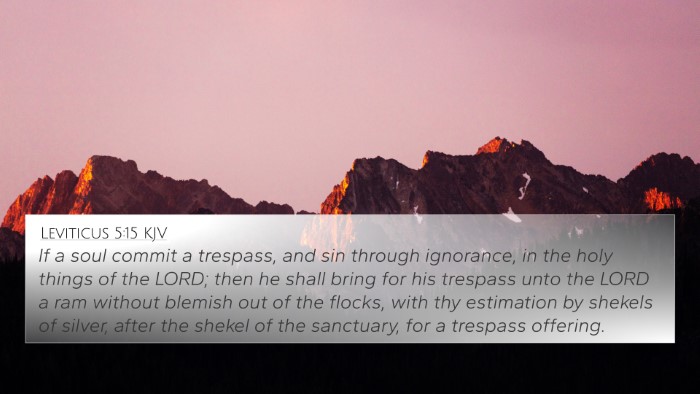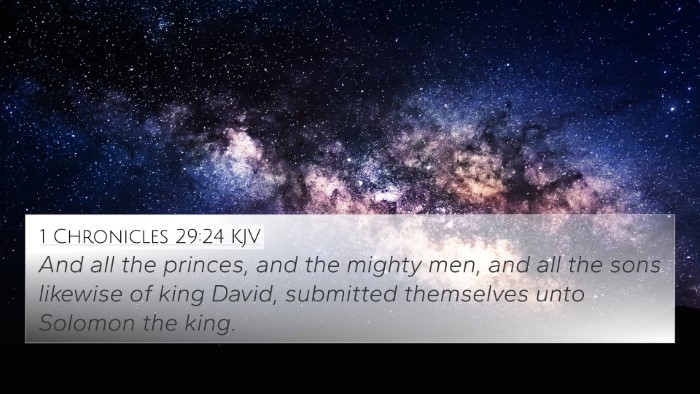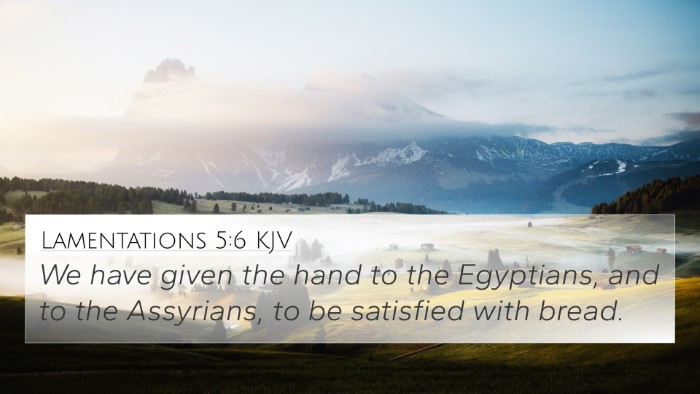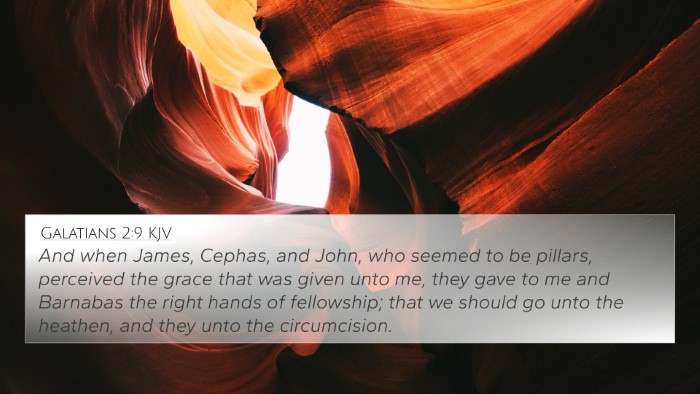Understanding Ezra 10:19
The verse Ezra 10:19 states, "And they gave their hands that they would put away their wives; and being guilty, they offered a ram of the flock for their trespass." This verse encapsulates a pivotal moment in the history of the Israelites, reflecting themes of repentance, covenant fidelity, and the seriousness of sin.
Contextual Background
Ezra 10 occurs after the return of the exiles from Babylonian captivity, focusing on the need for the Israelites to separate themselves from foreign wives, which was against the commands given in the Law. The actions described here illustrate the community's efforts to restore purity and adherence to covenantal obligations.
Summary of Key Insights
- Repentance and Accountability: The leaders and individuals who had intermarried with foreign women recognized their guilt and were willing to take responsibility. This act of accountability highlights the importance of confession and the relinquishment of actions that lead one away from God.
- Covenant Fidelity: The necessity to put away their wives stemmed from a desire to remain faithful to God's covenant, emphasizing that fidelity to God's commands must be prioritized over personal relationships.
- Offering for Trespass: The offering of a ram signifies atonement. Matthew Henry notes that true repentance involves both a recognition of sin and a desire to make amends. Sacrifices served as a means to seek forgiveness.
Commentary Insights
Matthew Henry
Matthew Henry highlights the gravity of the Israelites' situation, emphasizing their urgency to correct their wrongdoings. He suggests that their marriage to foreign women had serious spiritual implications and detracted from their commitment to Yahweh.
Albert Barnes
Albert Barnes emphasizes repentance in this verse. He points out that the act of offering a ram indicates a deep commitment to restoring their relationship with God, showing that the Israelites understood the need for a tangible demonstration of their contrition.
Adam Clarke
Adam Clarke notes that this episode illustrates the tension between cultural integration and faithfulness to God's commands. He views the Israelites' decision as a conscious effort to follow divine directives and to preserve their identity as God's chosen people.
Bible Verse Cross-References
Ezra 10:19 connects with several other biblical texts that address themes of purity, repentance, and covenant faithfulness:
- Deuteronomy 7:3-4: Prohibiting intermarriage with foreign nations to preserve religious purity.
- Nehemiah 10:30: A commitment to avoid intermarriage to maintain fidelity to God’s commandments.
- Malachi 2:11: Addressing the sin of marrying foreign women and its implications for worship.
- 1 Peter 3:7: Instructions regarding husbands and understanding their wives, emphasizing the importance of spiritual unity.
- James 4:4: Friendship with the world is enmity with God, reinforcing the necessity of separation from sinful influences.
- Romans 12:2: Encouragement to not conform to the world, resonating with the call for the Israelites to maintain their distinctiveness.
- 2 Corinthians 6:14: A caution against being unequally yoked, paralleling the issues faced by Ezra’s community.
Thematic Bible Verse Connections
The themes present in Ezra 10:19 resonate throughout scripture, particularly regarding faithfulness, repentance, and the consequences of sin. The narrative demonstrates how the people of God are called to uphold their commitment, ensuring they remain aligned with His will.
Inter-Biblical Dialogue
This passage invites readers to explore connections between both the Old Testament law and New Testament teachings on faithfulness and covenant relationships. The principle of prioritizing God's commandments over cultural practices is echoed throughout scripture, challenging believers to seek holiness in their lives.
Conclusion
Ezra 10:19 serves as a profound reminder of the complexities of living a life committed to God amidst external pressures. The combined insights from commentaries provide a nuanced understanding of the importance of repentance, accountability, and the sacrifices made for restoration. As believers, the call remains to follow God's commandments earnestly and to seek community support in this journey.

